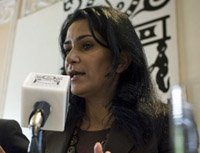Attacks on the Press 2010: Introduction
International Institutions Fail To Defend Press Freedom by Joel Simon UNESCO is the primary entity within the United Nations dedicated to the defense of press freedom. Yet in 2010, journalism and human rights organizations were forced to launch an international campaign to stop UNESCO from presenting a prize honoring one of Africa’s most notorious press…
Diplomats divert from issues at UNESCO symposium
UNESCO’s International Symposium on Freedom of Expression at the world culture organization’s Paris headquarters January 26 brought together a wide range of experts to construct a full picture of the state of freedom of expression in the world today. Not everyone in the audience liked what they heard.
Obiang prize suspended indefinitely
The Obiang prize, named for and funded by one of Africa’s most notorious dictators, was a very poor idea from the start and our goal, bluntly, was to kill it. We didn’t quite succeed in getting an outright cancellation, but the prize, while technically alive, is in a deep coma with virtually no chance of…
CPJ, partner groups urge UNESCO to pull Obiang prize
New York, August 12, 2010–The United Nations Educational, Scientific, and Cultural Organization should cancel the Obiang prize at its next session in October 2010, the Committee to Protect Journalists and 95 partner groups said in a letter to UNESCO Executive Board members today.

UNESCO’s dictator prize put on hold
Irina Bokova, UNESCO’s director-general, delivered a firm message on Tuesday to representatives from UNESCO’s 58-member executive board assembled at the organization’s Paris headquarters: Bestowing the Obiang International Prize for Research in the Life Sciences, named for and financed by one of the most repressive leaders in Africa, would do grave damage to the organization.

Cano laureates say no to UNESCO Obiang prize
Each year, UNESCO honors a courageous international journalist with the UNESCO/Guillermo Cano World Press Freedom Prize, named in honor of the Colombian editor murdered in 1986 by the Medellín Cartel. The prize is chosen by an independent jury and over the years I’ve attended several moving ceremonies in which some of the most daring journalists…
Press freedom groups ask UNESCO to reject Obiang money
Dear Director-General Bokova: We, the undersigned freedom of expression organizations, join with the Committee to Protect Journalists to express our grave concern regarding the $3 million donation by Equatorial Guinea President Teodoro Obiang for the administration of an international prize in life sciences. As a leading institution that advocates “empowering people through the free flow of ideas and by access to information and knowledge,” UNESCO should not accept funds from one of Africa’s worst violators of press freedom.

With new head, how will UNESCO fare on press freedom?
Irina Bokova is the quintessential diplomat—elegant, gracious, and fluent in five languages. But she must have a sharp elbow or two to have emerged victorious in the rough-and-tumble battle last September to lead UNESCO, the Paris-based U.N. agency that promotes culture, education, science, and, occasionally, press freedom around the world.